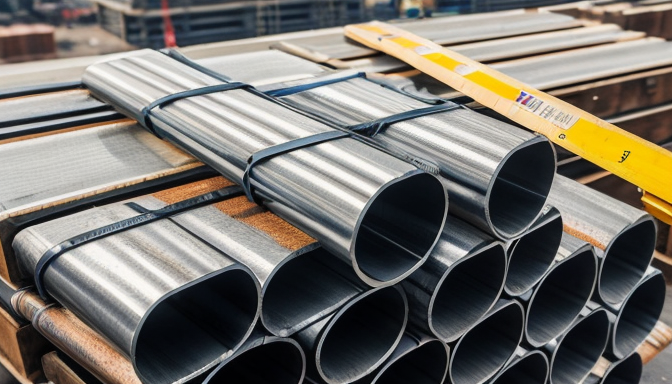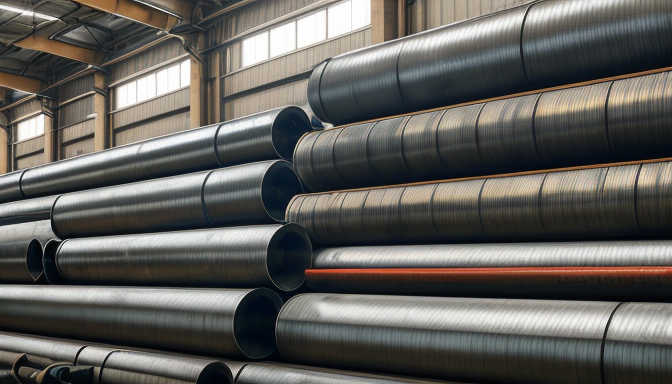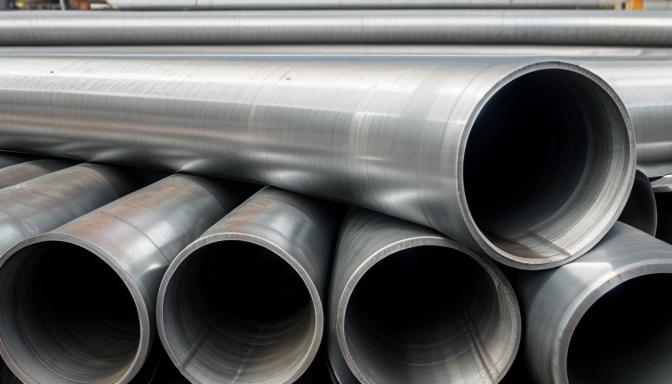Cold rolled steel pipes are essential materials in various industries. But what exactly are they? Simply put, they are steel pipes that undergo a process called cold rolling. This means they are shaped and formed at room temperature, which enhances their strength and finish. Imagine taking a piece of dough and rolling it out flat; that’s similar to how these pipes are made. The result? A product that is not only sturdy but also has a smooth surface.
Why should you care about cold rolled steel pipes? Well, they are everywhere! From construction sites to automotive applications, their versatility is unmatched. They are used in structures, machinery, and even furniture. This wide range of applications is due to their unique properties and benefits. For instance, they are resistant to corrosion and can withstand high temperatures. This makes them ideal for both indoor and outdoor use.
When you think about it, cold rolled steel pipes are like the unsung heroes of the construction world. They provide the backbone for many projects. Yet, many people don’t realize how crucial they are until something goes wrong. Have you ever seen a building under construction? Those sturdy frames? Yup, you guessed it—most likely made with cold rolled steel pipes!
Now, let’s talk about the pricing of these pipes. The cost can vary based on several factors, including market demand, the thickness of the pipes, and the manufacturing processes involved. It’s essential to keep an eye on market trends. Prices can fluctuate, and understanding these trends can help you budget better for your projects. Think of it as shopping for groceries; knowing when certain items are on sale can save you a lot of money.
In terms of weight, cold rolled steel pipes can be surprisingly heavy. This is something to consider when planning transportation and installation. The weight can affect everything from the type of machinery needed for lifting to the overall structural integrity of a project. For example, if you’re working on a large construction site, knowing the weight of the pipes will help you determine how many workers are needed for installation. It’s all about planning ahead!
Let’s not forget about the properties that make cold rolled steel pipes so special. They have excellent mechanical properties, meaning they can handle a lot of stress without deforming. Chemically, they are resistant to rust, which is a huge plus for outdoor applications. Physically, they offer a smooth finish that not only looks good but also enhances performance. It’s like choosing a high-quality tool; a better finish often means better performance.
Finally, sizing is crucial when it comes to cold rolled steel pipes. Choosing the right size can make or break your project. Standard sizes are available, but it’s essential to select the one that fits your specific needs. A pipe that’s too small can lead to leaks, while one that’s too large might be cumbersome to work with. Think of it like finding the perfect pair of shoes; the right fit makes all the difference!
DKP Steel Pipe Price
Understanding the pricing factors of DKP steel pipes is crucial for budgeting and procurement. Prices can vary widely based on several factors, and being informed can help you make smarter purchasing decisions. So, what influences these prices? Let’s break it down.
First off, the global market trends play a significant role. When demand for steel rises, prices tend to climb. Conversely, when there’s a surplus, prices may drop. It’s like a seesaw, constantly moving based on supply and demand. Additionally, factors like raw material costs and transportation expenses can also impact the final price of DKP steel pipes.
Another important aspect is the quality of the steel. Higher quality materials often come at a premium. This means that while you might save a few bucks on cheaper pipes, you may end up spending more in the long run due to maintenance and replacement costs. Think of it as buying a cheap pair of shoes versus investing in a good pair that lasts years.
Now, let’s take a look at how you can compare prices effectively. Here’s a simple table that outlines the average price ranges based on pipe diameter:
| Diameter (inches) | Average Price (per foot) |
|---|---|
| 1 | $2.50 – $4.00 |
| 2 | $3.00 – $5.50 |
| 3 | $4.00 – $7.00 |
| 4 | $5.00 – $9.00 |
This table gives you a rough idea of what to expect. However, keep in mind that prices can fluctuate based on location and supplier. Therefore, it’s wise to shop around and get quotes from multiple vendors.
In conclusion, when considering the price of DKP steel pipes, think about all the factors at play. From market trends to quality and supplier differences, every element can affect your bottom line. Always do your research and make informed decisions. After all, investing a little time in understanding prices can save you a lot of money in the long run!

DKP Steel Pipe Weight
The weight of DKP steel pipes plays a crucial role in various aspects of construction and manufacturing. Understanding how to calculate this weight is not just a number game; it’s about ensuring safety, efficiency, and cost-effectiveness in your projects. Imagine trying to lift a heavy load without knowing its weight. It could lead to disastrous outcomes! So, let’s dive into the details.
First off, the weight of a DKP steel pipe can vary significantly based on its dimensions and thickness. The formula to calculate the weight of a steel pipe is relatively straightforward. It’s based on the volume of the pipe multiplied by the density of steel. Here’s a simple breakdown:
| Pipe Diameter (mm) | Wall Thickness (mm) | Weight (kg/m) |
|---|---|---|
| 20 | 2 | 1.77 |
| 25 | 2.5 | 2.27 |
| 32 | 3 | 3.12 |
| 40 | 3.5 | 4.03 |
From this table, you can see that as the diameter and wall thickness increase, so does the weight. This is crucial for transportation. Imagine trying to transport a heavy load of pipes without knowing their weight. It could lead to overloading trucks, which is not just illegal, it’s dangerous!
Moreover, the weight of DKP steel pipes affects the structural integrity of your projects. Heavier pipes may require more robust support systems. Think of it like building a house. If the foundation isn’t strong enough to support the weight of the walls, the house could crumble. Similarly, in industrial applications, understanding the weight is essential for ensuring that the frameworks can handle the load.
When planning a project, always consider the weight of the DKP steel pipes you’ll be using. It’s not just about purchasing the right materials; it’s about planning how to transport and install them safely. Have you thought about how you’ll manage the logistics? This is where a solid understanding of pipe weight comes into play.
In conclusion, the weight of DKP steel pipes is more than just a number. It’s a vital factor that influences every stage of a project, from planning to execution. So, the next time you’re working with these pipes, remember: knowing their weight isn’t just useful; it’s essential!
DKP Steel Pipe Properties
When it comes to DKP steel pipes, understanding their properties is crucial. These pipes are not just hollow tubes; they are engineered for specific uses. So, what makes them stand out? Let’s dive into their unique characteristics.
First off, the **mechanical properties** of DKP steel pipes are impressive. They exhibit high tensile strength, which means they can withstand significant forces without breaking. This strength is essential in construction and manufacturing. Imagine trying to build a skyscraper. You wouldn’t want the materials to buckle under pressure, right? DKP pipes are designed to endure such challenges.
Next, we have their **chemical properties**. DKP steel pipes are often treated to resist corrosion. This is vital, especially in industries like oil and gas, where exposure to harsh environments is common. A little rust can lead to big problems. By using DKP pipes, companies can ensure longevity and reliability in their projects.
Now, let’s talk about the **physical properties**. DKP steel pipes have a smooth surface finish. This isn’t just for looks. A smooth surface reduces friction, making them ideal for fluid transport. Think about it: if you were trying to slide down a slide, wouldn’t you prefer a smooth one over a rough, bumpy surface? The same principle applies here. The smoother the pipe, the easier the flow.
Moreover, DKP pipes are available in various wall thicknesses and diameters. This versatility allows them to be used in a multitude of applications. From plumbing to structural support, these pipes can be tailored to fit specific needs. It’s like having a Swiss Army knife at your disposal; the right tool for every job!
Here’s a quick overview of the typical properties of DKP steel pipes in a table:
| Property | Description |
|---|---|
| Tensile Strength | High resistance to breaking under tension. |
| Corrosion Resistance | Ability to withstand rust and deterioration. |
| Surface Finish | Smooth finish for reduced friction. |
| Variety of Sizes | Available in multiple diameters and wall thicknesses. |
In conclusion, the properties of DKP steel pipes make them a reliable choice for many industries. Their strength, resistance to corrosion, and versatility ensure they meet various demands. Whether you’re in construction, manufacturing, or any other field, knowing these properties can help you make informed decisions. So, the next time you hear about DKP steel pipes, you’ll know they are more than just pipes; they are essential tools in modern engineering.

DKP Steel Pipe Sizes
This article explores the essential aspects of cold rolled steel pipes, including their pricing, weight, properties, sizes, and various applications in different industries.
Understanding the pricing factors of DKP steel pipes is crucial for budgeting and procurement. This section will cover market trends, influencing factors, and comparative pricing strategies.
The weight of DKP steel pipes is a critical consideration for transportation and structural integrity. Here, we will discuss weight calculations and how they impact project planning.
DKP steel pipes possess unique properties that make them suitable for various applications. This section will delve into mechanical, chemical, and physical properties that define their performance.
Choosing the correct size of DKP steel pipes is vital for efficient usage. The size of a pipe affects everything from installation to performance. If the size is off, it can lead to leaks or structural failures. So, what sizes are available?
DKP steel pipes come in various sizes, which can be categorized by their diameter and wall thickness. Commonly, the diameter can range from 1 inch to 12 inches or more. Wall thickness also varies, typically between 1.5 mm to 10 mm. This variation allows for flexibility in applications, depending on the specific needs of a project.
To give you a clearer picture, here’s a simple table showcasing some standard sizes:
| Diameter (inches) | Wall Thickness (mm) | Common Applications |
|---|---|---|
| 1 | 1.5 | Residential plumbing |
| 2 | 2.0 | Industrial piping |
| 4 | 3.0 | Structural frames |
| 6 | 4.0 | Heavy machinery |
| 10 | 5.0 | Oil and gas pipelines |
When selecting a size, consider the flow rate and pressure requirements of your system. A larger diameter allows for a higher flow rate but may be overkill for smaller applications. Conversely, a smaller pipe might restrict flow, leading to inefficiencies.
In conclusion, the right size of DKP steel pipes is not just about fitting into a space. It’s about ensuring safety, efficiency, and longevity in your projects. Always consult with a professional or conduct thorough research to find the perfect size for your specific needs.
Frequently Asked Questions
- What are cold rolled steel pipes?
Cold rolled steel pipes are tubes made from steel that have been processed at room temperature. This method enhances their strength and provides a smoother finish compared to hot rolled pipes. They are commonly used in various applications due to their durability and precision.
- How is the price of DKP steel pipes determined?
The pricing of DKP steel pipes is influenced by several factors, including market demand, raw material costs, and production methods. Additionally, geographical location and supplier relationships can also affect pricing. Staying updated on market trends is key to making informed purchasing decisions.
- What is the typical weight of DKP steel pipes?
The weight of DKP steel pipes varies based on their size and thickness. Generally, heavier pipes are used for structural applications, while lighter ones may be suitable for less demanding uses. Knowing the weight is crucial for transportation logistics and ensuring structural integrity in projects.
- What properties make DKP steel pipes suitable for different applications?
DKP steel pipes boast several advantageous properties such as high tensile strength, corrosion resistance, and excellent weldability. These characteristics make them ideal for industries ranging from construction to automotive, where reliability and performance are paramount.
- What sizes are available for DKP steel pipes?
DKP steel pipes come in a variety of sizes to meet different application needs. Common diameters range from small to large, and the thickness can vary as well. Selecting the right size is essential for ensuring optimal performance in any given project.
- Can DKP steel pipes be customized?
Yes, DKP steel pipes can often be customized to meet specific requirements. Many manufacturers offer options for different sizes, thicknesses, and finishes, allowing businesses to tailor their orders based on unique project needs.
- What industries commonly use DKP steel pipes?
DKP steel pipes are widely used across various industries, including construction, automotive, oil and gas, and manufacturing. Their versatility makes them a go-to choice for many applications, from structural frameworks to fluid transport systems.
